Related Research Articles

Dunedin is the second-largest city in the South Island of New Zealand, and the principal city of the Otago region. Its name comes from Dùn Èideann, the Scottish Gaelic name for Edinburgh, the capital of Scotland. The city has a rich Māori, Scottish, and Chinese heritage.
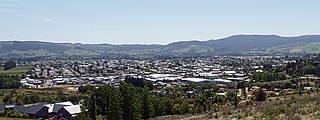
Mosgiel is an urban satellite of Dunedin in Otago, New Zealand, fifteen kilometres west of the city's centre. Since the re-organisation of New Zealand local government in 1989 it has been inside the Dunedin City Council area. Mosgiel has a population of approximately 14,800 as of June 2023. A nickname for Mosgiel is "The pearl of the plain". Its low-lying nature does pose problems, making it prone to flooding after heavy rains. Mosgiel takes its name from Mossgiel Farm, Ayrshire, the farm of the poet Robert Burns, the uncle of the co-founder in 1848 of the Otago settlement, the Reverend Thomas Burns.
The Anglican Church in Aotearoa, New Zealand and Polynesia, formerly the Church of the Province of New Zealand, is a province of the Anglican Communion serving New Zealand, Fiji, Tonga, Samoa, and the Cook Islands. Since 1992 the church has consisted of three tikanga or cultural streams: Aotearoa, New Zealand, and Polynesia. The church's constitution says that, among other things, it is required to "maintain the right of every person to choose any particular cultural expression of the faith". As a result, the church's General Synod has agreed upon the development of the three-person primacy based on this three tikanga system; it has three primates, each representing a tikanga, who share authority.
The Presbyterian Church of Aotearoa New Zealand (PCANZ) is a major Christian denomination in New Zealand. A part of the Reformed tradition, it is the largest Presbyterian denomination in New Zealand, and known for its relatively progressive stance on doctrine and social issues in comparison with smaller Presbyterian churches in the country. Presbyterianism was introduced to New Zealand by early 19th century settlers, particularly from Scotland and Ireland. It was historically most prevalent in the Otago region. The PCANZ was formed in 1901 with the amalgamation of southern and northern Presbyterian churches. It claims around 29,000 members.
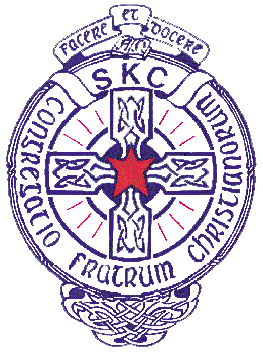
St Kevin's College in Oamaru, New Zealand, is a Catholic, coeducational, integrated, boarding and day, secondary school. It was founded by the Christian Brothers in 1927 for boys and became a co-educational school in 1983 after the Dominican Sisters closed down St Parick's College, Teschemakers, Oamaru. St Kevin's College became a state integrated school in 1983. The Christian Brothers ceased to be on the teaching staff of the college in the late 1990s but remained the school's proprietor, and so appointed representatives to the college board, until 2019 when they transferred the ownership of St Kevin's College to the Bishop of Dunedin.

The Diocese of Dunedin is one of the thirteen dioceses and hui amorangi of the Anglican Church in Aotearoa, New Zealand and Polynesia.
Trinity Catholic College is a Catholic, state-integrated, co-educational, secondary school located in central Dunedin, New Zealand. The school was founded in 1989 as the successor of several other secondary schools the oldest of which was founded in 1871. Trinity is the only Catholic secondary school in Dunedin and is open to enrolments from throughout the entire city. The school's proprietor is the Catholic Bishop of Dunedin.

St Patrick's College is a state-integrated Catholic boys' day and boarding secondary school located in Silverstream, Upper Hutt, New Zealand. It was established in 1931 when the original St Patrick's College, Wellington that had been established in 1885 was intended to be moved to a larger site more suited to a boarding school, but both colleges survived as independent institutions.
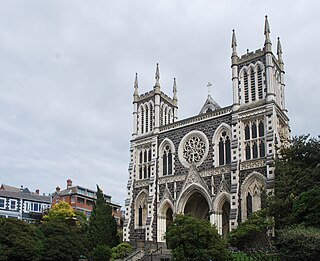
St Joseph's Cathedral is the cathedral for the Roman Catholic Diocese of Dunedin. It is located in City Rise in the city of Dunedin, New Zealand. It serves as the seat of the bishop of the Latin Church Diocese of Dunedin, which was erected on 26 November 1869.

St Patrick's College is a Roman Catholic boys' secondary school in Wellington, New Zealand.
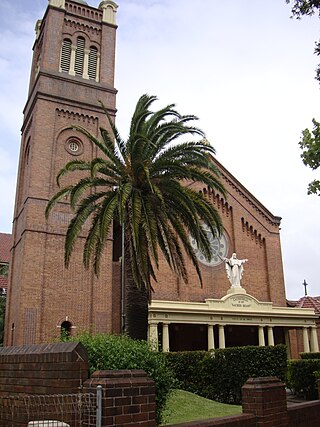
The Diocese of Maitland-Newcastle is a suffragan Latin Church diocese of the Archdiocese of Sydney, established in 1847 initially as the Diocese of Maitland and changed to the current name in 1995. The diocese covers the Hunter and Mid North Coast regions of New South Wales in Australia. The bishop of the diocese is Michael Kennedy.

The Roman Catholic Archdiocese of Wellington is the metropolitan archdiocese of New Zealand. Catholics number about 83,214. Parishes number 22 and the archdiocese extends over central New Zealand between Levin and Masterton in the north to Kaikoura to Westport in the south.

St Paul's Cathedral is an Anglican cathedral church located in The Octagon near the Dunedin Town Hall in the heart of Dunedin, New Zealand. The cathedral is the seat of the Bishop of Dunedin and the mother church of the Anglican Diocese of Dunedin.

St Peters College is an integrated state secondary school in Gore, Southland, New Zealand. It was founded in 1969 as a private co-ed school and was the first Catholic co-educational boarding school established in New Zealand.
Catholic sexual abuse cases in Australia, like Catholic Church sexual abuse cases elsewhere, have involved convictions, trials and ongoing investigations into allegations of sex crimes committed by Catholic priests, members of religious orders and other personnel which have come to light in recent decades, along with the growing awareness of sexual abuse within other religious and secular institutions.
Gerald Francis Ridsdale is an Australian laicised Catholic priest and sex offender. He was convicted between 1993 and 2017 of a large number of child sexual abuse and indecent assault charges against 65 children aged as young as four years. The offences occurred from the 1960s to the 1980s while Ridsdale worked as a school chaplain at St Alipius Primary School, a boys' boarding school in the Victorian regional city of Ballarat.

All Saints' Church is a heritage-listed Anglican church located in Dunedin, New Zealand. Established in 1865, the church is part of the Dunedin North parish in the Diocese of Dunedin.
14% of New Zealand Catholic diocesan clergy have been accused of abuse since 1950. Several high profile cases are linked to Catholic schools.
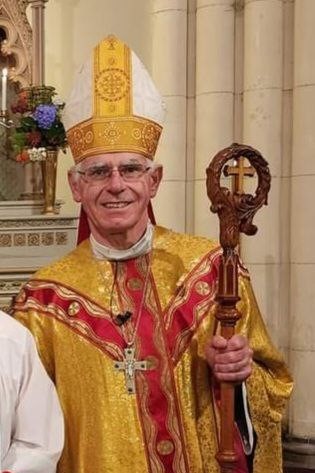
Michael Joseph Dooley is a New Zealand prelate of the Roman Catholic Church. He was appointed as the 7th Bishop of Dunedin, New Zealand on 22 February 2017, ordained bishop on 26 April 2018 and installed on 27 April 2018.
References
- 1 2 'Priest sentenced to five years' jail' on TVNZ Sunday website, viewed 11 September 2018
- 1 2 3 'Paedophile remains a priest' on Otago Daily Times website dated 2017-08-11, viewed 10 September 2018
- 1 2 3 'Sins of the father' on Otago Daily Times website dated 2017-08-01, viewed 10 September 2018
- 1 2 3 4 'Convicted priest left in 1972' by Rosemarie Smith, The Southland Times 1 September 2003 archived on peterellis.org.nz website, viewed 11 September 2018
- ↑ "Paedophile priest who served in Hamilton and Dunedin defrocked by Catholic church", Stuff News, 23 May 2019 [Retrieved 04 June 2019)
- ↑ "NZ Registry of Births, Deaths and Marriages" [Retrieved 05 May 2024]